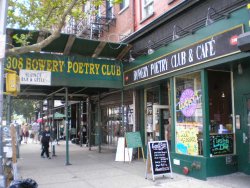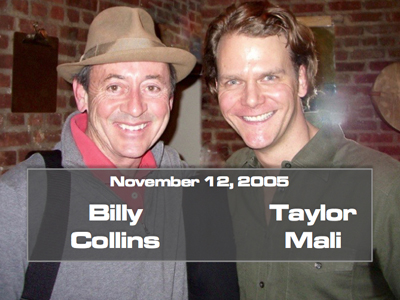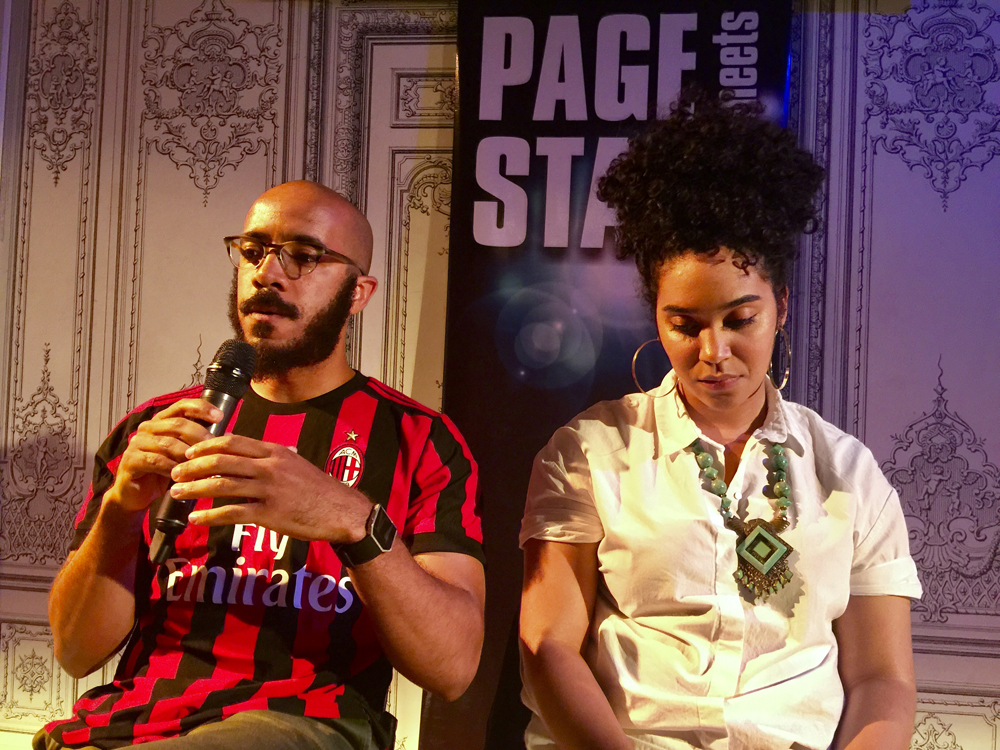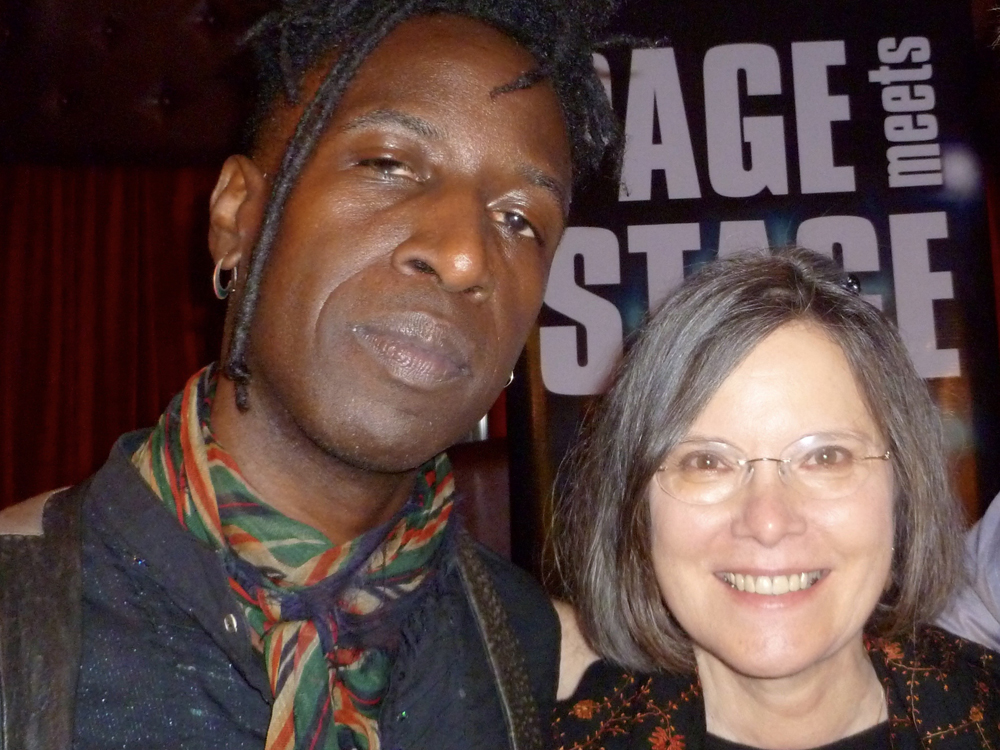Jesmyn Ward and Kevin Kwan Among TIME’s Most Influential, How to Make a Book, and More
University Press of New England to dissolve; a case for getting a graduate degree in creative writing; Jake Tapper’s fiction debut; and other news.
Jump to navigation Skip to content
University Press of New England to dissolve; a case for getting a graduate degree in creative writing; Jake Tapper’s fiction debut; and other news.
Maine high school student and asylum-seeker sues NEA over right to compete in Poetry Out Loud; Jhumpa Lahiri on translating Italian novelist Domenico Starnone; girdle books; and other news.
James Comey on his new political memoir; U.K. author goes undercover at an Amazon warehouse; Scott Rudin countersues Harper Lee estate over Broadway play; and other news.
In this 2016 video, Carmen Giménez Smith reads from a selection of her poems for the Lunch Poems reading series at the University of California in Berkeley. Smith speaks about her fifth book, Cruel Futures (City Lights Books, 2018), in “The Love of Labor, the Labor of Love” by Rigoberto González in the May/June issue of Poets & Writers Magazine.
Makeshift bridges, highway bridges, living root bridges, suspension bridges, viaducts. Across the earth, there are a variety of bridges we use, often without giving their significance much thought. Write a poem about a bridge you’ve encountered, perhaps one you pass over frequently or one you once stood on while traveling. Consider what emotions or memories you associate with the bridge, and if there are unexpected metaphors to unearth. What does the bridge cross over? How can you manipulate the structure, shape, or rhythm of the poem to reflect your themes?
Today at Columbia University in New York City, the winners of the 102nd annual Pulitzer Prizes were announced. Seven prizes in letters are awarded annually for works of literature published in the previous year. Each winner receives $15,000.
Frank Bidart won the prize in poetry for Half-Light: Collected Poems 1965–2016 (Farrar, Straus and Giroux). The finalists were Evie Shockley’s semiautomatic (Wesleyan University Press) and Patricia Smith’s Incendiary Art (TriQuarterly Books).
Andrew Sean Greer won the prize in fiction for his novel Less (Lee Boudreaux Books). The finalists were Elif Baufman’s The Idiot (Penguin Press) and Hernan Diaz’s In the Distance (Coffee House Press).
Caroline Fraser won the prize in biography for Prairie Fires: The American Dreams of Laura Ingalls Wilder (Metropolitan Books). The finalists were John A. Farrell’s Richard Nixon: The Life (Doubleday) and the Kay Redfield Jamison’s Robert Lowell, Setting the River on Fire: A Study of Genius, Mania, and Character (Knopf)
Visit the Pulitzer Prize website for a complete list of winners and finalists in each of the twenty-one categories, including general nonfiction, journalism, history, drama, and music.
Hungarian-American newspaper publisher and journalist Joseph Pulitzer established the Pulitzer Prizes in 1911, and the first prize was awarded in 1917. The 2017 winners included poet Tyehimba Jess and fiction writer Colson Whitehead.
Read an interview with Frank Bidart from the May/June 2013 issue of Poets & Writers Magazine, and listen to an excerpt of Andrew Sean Greer’s third novel, The Story of a Marriage.
(Photo: Frank Bidart; Credit: Webb Chappell)
Bowery Poetry is home to poets, writers, and artists of diverse talents and skill sets. The venue is run by Bowery Arts + Science, a nonprofit organization that encourages cooperation and advancement among artists and cultural workers, aims to develop and produce works by emerging poets and performers, and promote the exploration, improvement, and advancement of the arts as a changemaking force in society.

A four-time National Poetry Slam champion, Taylor Mali is one of the original poets to appear on the HBO series Def Poetry Jam and is the author of two collections of poetry and a book of essays, What Teachers Make: In Praise of the Greatest Job in the World (G. P. Putnam’s Sons, 2012). He is the founding curator of Page Meets Stage, a monthly poetry series in New York City that pairs two poets to perform a conversation through their work.
 How did Page Meets Stage begin? What was your inspiration?
How did Page Meets Stage begin? What was your inspiration?
The inspiration for the series actually started with Billy Collins. I’ve been a fan of his work for years and now consider him a mentor. In the early 1990s, I used to write him a fan letter every couple months or so, and every letter ended with an invitation for him to come read at a poetry slam series that I used to help curate at the Bowery Poetry Club. In 2005, after a decade of these letters, he finally agreed, and he had a wonderful time. I suggested that we arrange another reading with just the two of us and call it “Page vs. Stage.” He liked the idea, and somewhere along the way in planning the format for the night, we decided that it would be interesting if we went back and forth, poem for poem, perhaps having a conversation through our work.
The reading was a great success, in part I suspect, because of the unique format, which the audience loved. Since then, we’ve had several different pairings of poets, always with one representing a more performative style of poetry and the other, more literary. Currently, I work with Mahogany L. Browne, April Ranger, and MaryCae to produce the show once a month and we are still at the Bowery Poetry Club!
What have the challenges been to sustaining such a long-running program?
Promotion has always been the issue. There’s always something good to watch on TV, and people seem happy these days to sit in a comfy chair for a few hours with only their smart phones (I know because I’ve been that person). It’s an awful feeling when you craft a spectacular pairing—with two poets who don’t know each other but whose work blends together in just the right way—and then only two people show up for the show! We’ve had some wonderful pairings that were so poorly attended that I’ve been tempted to call it quits.
 Has your mission or your vision for the organization changed over the years? What’s most important for you right now?
Has your mission or your vision for the organization changed over the years? What’s most important for you right now?
In the beginning, I was probably on a mission to garner more respect for spoken word poets. I wanted to show the world that spoken word poets are just as concerned with craft as the next poet; but they understand that how you read a poem is also important. In the thirteen years we’ve been around, the line between page and stage has been bent in some places and blurred in others. There are former slam poets who are finalists for the National Book Award like Danez Smith, university professors such as Patricia Smith and Jeff McDaniel, and even Pulitzer Prize winners and Guggenheim fellows such as Tyehimba Jess.
Furthermore, we’ve had about six poets who have done both sides of the pairing, stage the first time and page the second. So these days, we don’t care quite so much about labels. We just try to craft a great night for people to hear great poetry.
 What has been your most rewarding experience as a curator and organizer?
What has been your most rewarding experience as a curator and organizer?
There have been a lot of great pairings and some fantastic ones coming up as well, but a couple of moments have stuck with me. I got to share the stage with Galway Kinnell before he died. Back then we also traded poems during readings so Galway read one of my poems, and I performed his poem “The Waking” from memory, which takes five minutes to recite and is probably the longest poem I’ve ever memorized.
I’d also been trying to get my friend Saul Williams to participate for years, and I finally got him to agree in 2014. I asked what his dream pairing would be, and he said, “Without a doubt, Carolyn Forché.” As luck would have it, I had just taken a workshop with Carolyn, so I was able to set it up. That’s a pairing I would never have concocted on my own, but it remains one of my favorites.
What’s next for the series?
I am hesitant to even mention this because it’s still months away, but two of my favorite poets, Ocean Vuong and Sharon Olds, are scheduled to read together on Sunday, October 28, which will be very exciting.
Support for the Readings & Workshops Program in New York City is provided, in part, by public funds from the New York State Council on the Arts, and the New York City Department of Cultural Affairs, with additional support from the Frances Abbey Endowment, the Cowles Charitable Trust, and the Friends of Poets & Writers.
Photos: (top) Billy Collins and Taylor Mali in 2005 for the inaugural reading of the series (Credit: Taylor Mali). (middle) Clint Smith and Elizabeth Acevedo (Credit: Taylor Mali). (bottom) Saul Williams and Carolyn Forché (Credit: Taylor Mali).
Poet Danez Smith has won the inaugural Four Quartets Prize for “summer, somewhere,” a sequence of poems from the collection Don’t Call Us Dead (Graywolf Press, 2017). Sponsored by the T. S. Eliot Foundation and Poetry Society of America, the new $20,000 award is given annually for a unified and complete sequence of poems published in the United States in the previous two years. Linda Gregerson, Ishion Hutchinson, and Jana Prikryl judged.
The finalists, who each received $1,000, were Geoffrey G. O’Brien for “Experience in Groups” from Experience in Groups (Wave Books, 2018), and Kathleen Peirce for Vault: a poem (New Michigan Press, 2017).
Actor Jeremy Irons announced the winner this afternoon at a ceremony at the National Arts Club in New York City. Of Smith’s work, the judges said: “‘Do you know what it’s like to live / on land who loves you back?’ In “summer, somewhere,” Danez Smith imagines just such a land for the black boys who have died by violence in our time: the violence of vigilantism, of police brutality, of stigmatized poverty and illness, of despair. From a bitter landscape, this unblinking sequence manages to wrest a celebration of black lives, fusing metaphor and emotion in a transformative whole.”
Don’t Call Us Dead, Smith’s second collection, was a finalist for the 2017 National Book Award. Smith’s first collection, [insert] boy (YesYes Books, 2014), won the Kate Tufts Discovery Award and the Lambda Literary Award. Smith has received fellowships from the National Endowment for the Arts, the Poetry Foundation, and the McKnight Foundation.
The Poetry Society of America, based in New York City, is dedicated to promoting poetry in American culture. The T. S. Eliot Foundation, based in London, is dedicated to celebrating poetry, literacy, and “all things Eliot.” The inaugural Four Quartets Prize celebrates the seventy-fifth anniversary of the U.S. publication of Eliot’s Four Quartets.
(Photo: Danez Smith; Credit: David Hong)
In this Chicago magazine video, poets Raych Jackson, Natalie Rose Richardson, and Jamila Woods read from their poems which are featured in the new poetry anthology, The BreakBeat Poets Volume 2: Black Girl Magic (Haymarket Books, 2018). LaToya Jordan speaks with Mahogany L. Browne, one of the editors of the anthology, in “At the Center of Hip-Hop and Poetry” in the May/June issue of Poets & Writers Magazine.